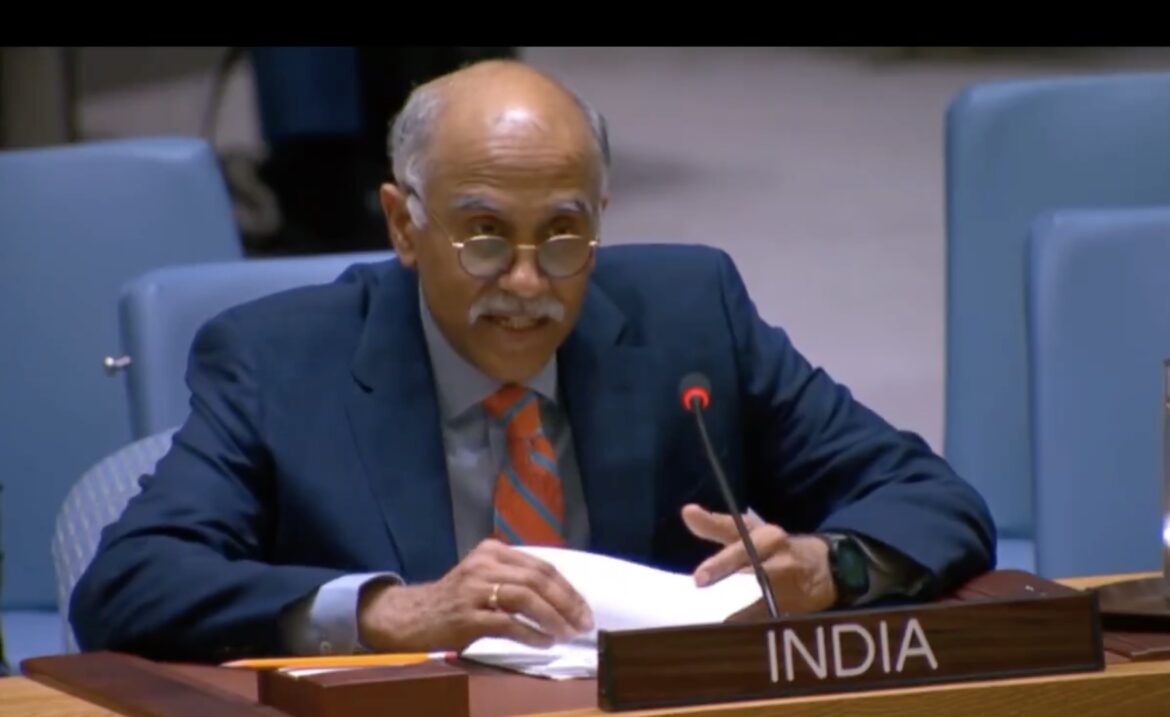India’s Permanent Representative to the United Nations, Ambassador Parvathaneni Harish, underscored the country’s firm commitment to “maritime security and counterterrorism” as key components of its “national security and economic interests.”
He was speaking at the United Nations Security Council’s high-level open debate titled “Strengthening Maritime Security through International Cooperation for Global Stability,” on May 20, 2025, held under the agenda item “Maintenance of international peace and security.”
Ambassador Harish expressed appreciation to Greek Prime Minister Kyriakos Mitsotakis for presiding over the debate and congratulated Greece on assuming the Council’s Presidency for the month. He noted that India’s maritime security strategy is grounded in “robust defense capabilities, regional diplomacy, international cooperation and domestic infrastructure development.” The country continues to refine this approach in response to evolving threats and shifting geopolitical dynamics in the Indo-Pacific.
Emphasizing the strategic importance of oceans, he remarked that maritime security is essential for economic growth, with global trade routes, energy supplies, and geopolitical stability deeply tied to secure and open seas.
“India, having a long coastline, extensive seafarer community, and capable maritime forces, is actively pursuing its role as a responsible maritime power to safeguard its interests and address emerging threats,” he stated. “India’s maritime security strategy is broad and multifaceted, addressing both traditional threats from state actors and non-traditional threats from piracy, contraband smuggling, illegal human migration, IUU fishing, maritime incidents, hybrid threats and maritime terrorism.”
Recalling India’s leadership during its presidency of the UN Security Council in 2021, Ambassador Harish cited Prime Minister Narendra Modi’s earlier emphasis on maritime security. He reiterated five foundational principles that reflect India’s comprehensive approach: They include Removal of barriers from legitimate maritime trade; Peaceful settlement of disputes as per international law; Jointly addressing the natural disasters and maritime threats created by non-state actors; Preservation of the marine environment and resources; and Encouragement of responsible maritime connectivity.
Ambassador Harish reaffirmed that India is a signatory to the United Nations Convention on the Law of the Sea (UNCLOS), adopted on December 10, 1982, which provides the legal framework governing activities at sea. “India believes that States should resolve disputes in the maritime security domain through peaceful means, including by adhering to pronouncements of international institutions that are established in accordance with rules-based framework,” he said, emphasizing India’s commitment to a free, open, and rules-based maritime order.
To further this vision, he outlined India’s efforts in regional capacity building to address emerging security challenges. In September 2024, India launched Operation Sadbhav to deliver humanitarian aid following Typhoon Yagi, which impacted Laos, Vietnam, and Myanmar.
In April 2025, India organized a large-scale multilateral maritime engagement with ten African nations, titled Africa India Key Maritime Engagement (AIKEYME or Aikyam, meaning “Unity” in Sanskrit). “This initiative aims to develop collaborative solutions to regional maritime challenges, enhance interoperability, and strengthen the friendly relations between India and African nations,” he said.
Ambassador Harish emphasized that India’s maritime security strategy is focused on strong surveillance, effective coordination, and rapid response to safeguard its coastline and sea lanes. The strategy aligns with Prime Minister Modi’s vision of MAHASAGAR (Mutual and Holistic Advancement for Security and Growth Across Regions) which promotes global maritime cooperation and security.
“India is actively involved in numerous maritime security missions and takes part in joint naval exercises with a multitude of partners at regional and global levels. These efforts focus on non-traditional threats—like piracy, natural disasters, and other illicit maritime activities—that affect peace and security in the region,” he said.
He further stressed that “Inclusiveness and cooperation are key principles of India’s maritime approach,” highlighting the Indian Navy’s response to recent attacks on commercial vessels and rising piracy in the Western Arabian Sea. Over the past year, India has deployed more than 35 naval ships, conducted over 1,000 boarding operations, and responded to more than 30 incidents.
Ambassador Harish noted that these efforts saved over 520 lives, regardless of nationality. The Indian Navy has also escorted more than 312 merchant vessels, collectively carrying over 11.9 million metric tons of cargo worth more than $5.3 billion USD.
Additionally, India remains actively engaged in Search and Rescue (SAR) and Humanitarian Assistance and Disaster Relief (HADR) operations, particularly in the Indian Ocean Region, further demonstrating its commitment to maritime safety and stability.






